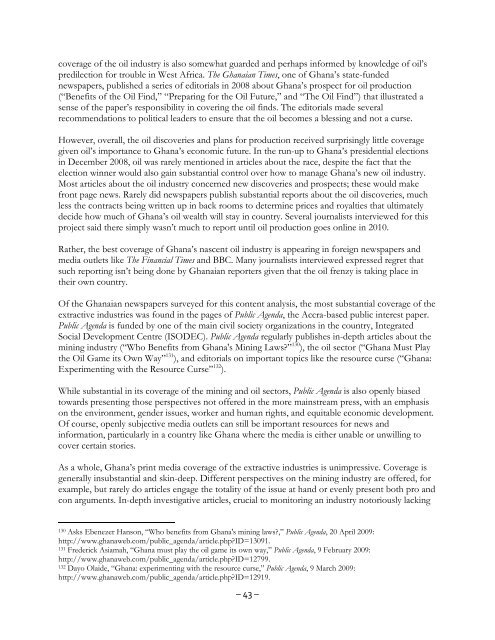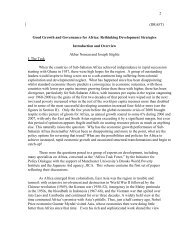mining company active in Ghana. These stories might highlight Newmont’s support <strong>for</strong> malariaprevention (“Newmont Sponsors Malaria Prevention” 122 ), <strong>for</strong> example, or its funding of aneducation seminar <strong>for</strong> children on the benefits of mining (“Children Briefed On Importance OfMining” 123 ) and its support of local environmental clubs (“Newmont Supports Formation ofEnvironmental Clubs” 124 ).The stories themselves read like press releases, with perhaps a couple of quotes from a companyspokesperson, and a general description of the event or announcement. Promotional stories providebusinesses like Newmont with a positive media image. A recent article in The Ghanaian Chronicleabout Newmont’s funding of some classrooms reveals how sycophantic such coverage can be:“Newmont, one of the most prolific and magnificent mining companies in the world, wasestablished in 1921, and came to Ghana in August 2002” (“Newmont Akyem to Support FourCommunities” 125 ).More common in Ghana’s print media are news stories that cover official mining companyannouncements and initiatives. These stories, again, read like press releases, are usually singlesourced(a company’s written statement or a quote from a company representative), and generallyoffer positive coverage of the company (i.e., “Newmont Appoints Regional Vice President” 126 ).Print coverage of the mining industry in Ghana is not all positive, however, and many storiespublished are critical of the impact that mining is having on Ghanaian communities. These storiestend to focus on allegations made by civil society organizations concerning the environmentaldamage caused by a project (“Mining Coalition Objects to Surface Mining in Forest Reserves” 127 ),calls <strong>for</strong> better distribution of national wealth (“Wacam Calls <strong>for</strong> Better Royalties On Mining” 128 ), ora company’s poor or discriminatory treatment of its workers (“Newmont Denies Banning WomenFrom Getting Pregnant” 129 ). However, like the positive stories about the extractive industries, thesecritical stories tend to be minimally sourced, and do not usually attempt to investigate the allegationsor offer the accused an opportunity to respond. As a result, it’s difficult to get a balanced andnuanced picture of the mining industry in Ghana from media coverage.Notably, however, numerous Ghanaian newspapers appear to publish both types of stories aboutthe extractives, both negative and positive, suggesting that there is space within the same papers topresent different perspectives so that media coverage of the extractive isn’t totally imbalanced.Coverage of the oil discoveries in Ghana and plans <strong>for</strong> extraction is generally positive and optimistic,focusing on the discovery’s potential <strong>for</strong> wealth creation and economic development. However,122 “Newmont Sponsors Malaria Prevention,” Accra Mail, 17 May 2008.123 Kingsley E. Hope, “Children Briefed On Importance Of Mining,” The Ghanaian Times, 27 April 2006.http://www.newtimesonline.com/content/view/2575/245/.124 Michael Boateng, “Newmont Supports Formation of Environmental Clubs,” Ghanaian Chronicle, 6 March 2008.125 Isaac Akweetey, “Newmont Akyem to Support Four Communities,” The Ghanaian Chronicle, 7 April 2009:http://allafrica.com/stories/200904070624.html.126 “Newmont Appoints Regional Vice President,” The Ghanaian Times, 17 May 2008. Accessed 8 December 2008:http://www.newtimesonline.com/content/view/15822/147/.127 “Mining coalition objects to surface mining in <strong>for</strong>est reserves,” Ghana News Agency, 13 July 2008:http://gbcghana.com/news/21300detail.html.128 Daniel Nonor, “Wacam Calls <strong>for</strong> Better Royalties On Mining,” The Ghanaian Chronicle, 7 May 2008.129 Michael Boateng, “Newmont Denies Banning Women From Getting Pregnant,” The Ghanaian Chronicle, 7 January2008: http://allafrica.com/stories/200801071259.html.– 42 –
coverage of the oil industry is also somewhat guarded and perhaps in<strong>for</strong>med by knowledge of oil’spredilection <strong>for</strong> trouble in West Africa. The Ghanaian Times, one of Ghana’s state-fundednewspapers, published a series of editorials in 2008 about Ghana’s prospect <strong>for</strong> oil production(“Benefits of the Oil Find,” “Preparing <strong>for</strong> the Oil Future,” and “The Oil Find”) that illustrated asense of the paper’s responsibility in covering the oil finds. The editorials made severalrecommendations to political leaders to ensure that the oil becomes a blessing and not a curse.However, overall, the oil discoveries and plans <strong>for</strong> production received surprisingly little coveragegiven oil’s importance to Ghana’s economic future. In the run-up to Ghana’s presidential electionsin December 2008, oil was rarely mentioned in articles about the race, despite the fact that theelection winner would also gain substantial control over how to manage Ghana’s new oil industry.Most articles about the oil industry concerned new discoveries and prospects; these would makefront page news. Rarely did newspapers publish substantial reports about the oil discoveries, muchless the contracts being written up in back rooms to determine prices and royalties that ultimatelydecide how much of Ghana’s oil wealth will stay in country. Several journalists interviewed <strong>for</strong> thisproject said there simply wasn’t much to report until oil production goes online in 2010.Rather, the best coverage of Ghana’s nascent oil industry is appearing in <strong>for</strong>eign newspapers andmedia outlets like The Financial Times and BBC. Many journalists interviewed expressed regret thatsuch reporting isn’t being done by Ghanaian reporters given that the oil frenzy is taking place intheir own country.Of the Ghanaian newspapers surveyed <strong>for</strong> this content analysis, the most substantial coverage of theextractive industries was found in the pages of Public Agenda, the Accra-based public interest paper.Public Agenda is funded by one of the main civil society organizations in the country, IntegratedSocial Development Centre (ISODEC). Public Agenda regularly publishes in-depth articles about themining industry (“Who Benefits from Ghana's Mining Laws?” 130 ), the oil sector (“Ghana Must Playthe Oil Game its Own Way” 131 ), and editorials on important topics like the resource curse (“Ghana:Experimenting with the Resource Curse” 132 ).While substantial in its coverage of the mining and oil sectors, Public Agenda is also openly biasedtowards presenting those perspectives not offered in the more mainstream press, with an emphasison the environment, gender issues, worker and human rights, and equitable economic development.Of course, openly subjective media outlets can still be important resources <strong>for</strong> news andin<strong>for</strong>mation, particularly in a country like Ghana where the media is either unable or unwilling tocover certain stories.As a whole, Ghana’s print media coverage of the extractive industries is unimpressive. Coverage isgenerally insubstantial and skin-deep. Different perspectives on the mining industry are offered, <strong>for</strong>example, but rarely do articles engage the totality of the issue at hand or evenly present both pro andcon arguments. In-depth investigative articles, crucial to monitoring an industry notoriously lacking130 Asks Ebenezer Hanson, “Who benefits from Ghana's mining laws?,” Public Agenda, 20 April 2009:http://www.ghanaweb.com/public_agenda/article.php?ID=13091.131 Frederick Asiamah, “Ghana must play the oil game its own way,” Public Agenda, 9 February 2009:http://www.ghanaweb.com/public_agenda/article.php?ID=12799.132 Dayo Olaide, “Ghana: experimenting with the resource curse,” Public Agenda, 9 March 2009:http://www.ghanaweb.com/public_agenda/article.php?ID=12919.– 43 –
- Page 1 and 2: THEREWILLBE INKA study of journalis
- Page 3 and 4: AcknowledgementsThis paper has bene
- Page 7 and 8: Executive SummaryPurpose of the Rep
- Page 9 and 10: journalists in these countries that
- Page 11 and 12: Existing International Training Opp
- Page 13 and 14: • Consumer Affairs and Informatio
- Page 15 and 16: Background 3Of the three countries
- Page 17 and 18: pervasive conflict in the Niger Del
- Page 19 and 20: 3) Crises or disruptions, where som
- Page 21 and 22: Low pay and low regardOne of the mo
- Page 23 and 24: Even in cases where working journal
- Page 25 and 26: But while some reporters think FOIB
- Page 27 and 28: When asked how much the media could
- Page 29 and 30: the effects of these challenges for
- Page 31 and 32: detailed analysis of the opportunit
- Page 33 and 34: journalist said he has, however,
- Page 35 and 36: completely make use of some of the
- Page 37 and 38: money. Their knowledge of what medi
- Page 39 and 40: Notes on conducting research in Nig
- Page 41 and 42: Ghana- 35 -
- Page 43 and 44: evenues each year,” 106 which wou
- Page 45 and 46: entertainment news, scandals, and p
- Page 47: The rise of business-focused journa
- Page 51 and 52: needed supplementary income to cash
- Page 53 and 54: as supporting one political party o
- Page 55 and 56: Numerous journalists recounted how
- Page 57 and 58: Training programs available to busi
- Page 59 and 60: Amos Safo, editor-in-chief at the p
- Page 61 and 62: Notes on conducting research in Gha
- Page 63 and 64: Background 136Literacy and Educatio
- Page 65 and 66: “sufficient information” about
- Page 67 and 68: or criminal charges for content the
- Page 69 and 70: have such difficulty obtaining info
- Page 71 and 72: The majority of those interviewed b
- Page 73 and 74: commitment to their profession and
- Page 75 and 76: Notes on Conducting Research in Uga
- Page 77 and 78: Recommendations for Revenue Watch I
- Page 79 and 80: people who have no journalism backg
- Page 81 and 82: analyzes business,” he said, “e
- Page 83 and 84: A journalist with The Punch said,
- Page 85 and 86: The Media Foundation for West Afric
- Page 87 and 88: Length of TrainingRoughly three-qua
- Page 89 and 90: industries, for instance, ought to
- Page 91 and 92: otherwise being published in the pr
- Page 93 and 94: Non-Training Recommendations for Ug
- Page 95 and 96: Appendix A: NigeriaPotential Partne
- Page 97 and 98: journalists. Biakolo is very profes
- Page 99 and 100:
Television Stations• Nigerian Tel
- Page 101 and 102:
have two to four month professional
- Page 103 and 104:
City: AccraTelephone: +233 (021) 22
- Page 105 and 106:
Fax: +256 414 255 495E-mail: umdf@a
- Page 107 and 108:
• What do you think are the most
- Page 109 and 110:
Appendix E: Survey Questions1. Name
- Page 111 and 112:
18. How effective were the teaching
- Page 113 and 114:
28. What are the most important cha
- Page 115 and 116:
1. Journalists by Country2. How wou
- Page 117 and 118:
5. How often do you travel out of t
- Page 119 and 120:
9. Which organization(s) sponsored
- Page 121:
12. After completing the training(s














